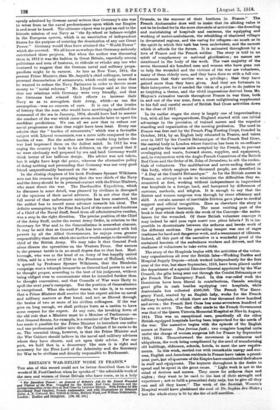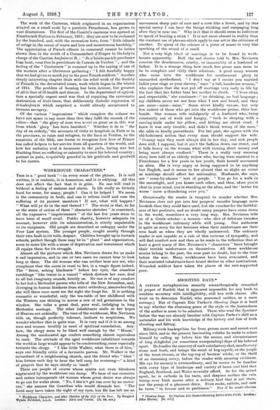BRITAIN'S WAR-RELIEF WORK IN FRANCE.• Ties aim of this record
could not be better described than in the words of Id. Paul Cambon when he speaks of " the admirable work of the men and women of Great Britain who have come, as in a holy * For Dauntless Prance: an Account of Britain's Aid for the French Wounded and Victim of the War. Compiled for the British Red Cross Societies and the British Committee of the French Bed Cross by Laurence Blnyon. With Preface by His Excellency Paul Cambon, French Ambassador, and with IllustaatIons by Edmund Dulac, A. N. Cotterell, Mrs. Wilfrid de Glehn, Herbert Ward, and William Rothensteln. London: Hodder and Stoughton. Iles. ed. net.]
Crusade, to the succour of their brethren in France." The French Ambassador does well to insist that its abiding value is not to be looked forin the mere chronicle of activities—the founding and maintaining of hospitals and canteens, the equipping and working of motor-ambulances, the rebuilding of shattered villages in devastated regions, and the caring for refugees—so much as in the spirit in which this task has been undertaken, and the earnest which it affords for the future. It is animated throughout by a love of France and the French soldier. The story is told in no spirit of complacency or national glorification ; no names are mentioned in the body of the work. The vast majority of the seven thousand six hundred men and women who have gone out to help the wounded and the victims of the war are volunteers, many of them elderly men, and they have done so with a full con- sciousness that their service was a privilege ; that they have gained more than they have given. And they are fortunate in their interpreter, for it needed the vision of a poet to do justice to so inspiring a theme, and the vivid impressions derived from Mn. Binyon's extensive travels throughout France in war time, both in and out of the war zone, form a most enlightening supplement to his full and careful record of British Red Cross activities down to the close of 1917.
In its earlier stages the story is largely one of improvisation; but, with all her unpreparedness, England started with one initial
advantage In the provision of trained nurses and the superior standing and organization of the nursing profession. The need in France was first met by the French Flag Nursing Corps, founded in October, 1914, by an English lady educated in France, and taken over in 1917 by the Cornite Britannique of the French Red Cross, the central body in London whose function has been to co-ordinate and expedite the various units accepted by the French, to prevent overlapping and waste, forward stores, supplies, and equipment, and, in conjunction with the Anglo-French Committee of the British Red Cross and the Order of St. John of Jerusalem, to sift the creden- tials of volunteers. The multifarious and never-ending duties of this body, which employs two thousand people, are desoribed in " A Day at the Comitd Britannique." As for the British nurses in France, no attempt is made to minimize the difficulties they en- countered at first, working without independence in improvised war hospitals in a foreign land, and hampered by differences of customs, methods, and religion. It is enough to say that the Sisters and women surgeons won through by sheer efficiency and skill. A certain amount of inevitable friction gave place to cordial support and official recognition. Here as elsewhere the story is one of progressive harmony. The most exciting part of the book is that which deals with the work of the Convoys—the ambu- lances for the wounded. Of these British volunteer convoys it may indeed be said quae regio noetri non plena laborLa f It is im- possible to discriminate between the arduous and heroin work of the different sections. The prevailing temper was one- of eagle/ readiness for hard and dangerous work, and a resentment of idleness. Indeed, all this part of the narrative is a wonderful proof of the sustained heroism of the ambulance workers and drivers, and the readiness of volunteers to take extra risks.
The story of the Hospitals begins with the activities of the volun- tary organizations all over the British Isles—Working Parties and Hospital Supply Depots—which worked independently for the first year of the war, but since September, 1915, have been placed under the department of a special Director-General appointed by the War Council, the gifts being sent out through the Comity Britannique or the French War Emergency Fund. In this war-relief work the Dominions have been liberal in contributions, Canada sending great gifts in cash besides equipping two hospitals, while Australasia has collected £500,000. The French War Emer- gency Fund, started by an English lady, works for the French military hospitals, of which there are four thousand three hundred and seven ; the French Red Cross has some seventeen hundred of its own to serve. The first offer made to the French Government was that of the Queen Victoria Memorial Hospital at Nice in August, 1914. This was an exceptional ease, practically all the other British-equipped hospitals having been Improvised for the needs of the war. The narrative begins with the episode of the English nurses at Namur. Dux femina „testi i two complete hospital units under the charge of women surgeons left for France by September 12th, 1914. Thenceforward the movement is continuous and ubiquitous, the work being complicated by the need of transforming old buildings, chateaux, schools, hotels, to meet the new require- ments. In this work, carried out with remarkable energy and suc- cess, English and American residents in France have taken a promi- nent part, but all quarters of the Empire have contributed their share in staff and equipment. The keynote throughout is the desire to spend and be spent in the great cause. " Light work is not to the mind of doctors and nurses. They crave for arduous days and nights ; they want to be used to the last of their strength and experience ; not to fulfil a prescribed duty only, but to give all they can and all they know." The work of the Scottish Women's Hospital would have gladdened the soul of Dr. Sophia Jex-Blake ; but the whole story is lit by the fire of self-sacrifice.
The work of the Canteens, which originated in an organization created on a small scale by a patriotic Frenchman, has grown to vast dimensions. The first of the Comitd's canteens was opened at Hazebrouck Station in February, 1915 ; they are now to be reckoned by the hundred, and, with the recreation huts, form " little islands of refuge in the ocean of waste and loss and monotonous hardship." The appreciation of French officers in command cannot be better shown than in the words of a Commandant d'Etapes to the ladyin charge of the Cantine Anglaise at R. : " Je reluisite pas isle proelamer bion haut, vous 'Res la providence deyarmee de Verdun " ; and the feeling of the " Canteeners " is summed up in the saying of one of the workers after a Christmas gathering : " I felt fearfully happy that we had given so much joy to the poor French soldiers." Another deeply interesting chapter deals with the relief work of the Society of Friends in the devastated zones, work which began in the winter of 1914. The problem of housing has been intense, but greatest of all is that of ill-health and disease. In the department of agricul- ture a specially urgent need was that of repairing the systematic destruction of fruit-trees, that deliberately diabolic expression of Schatienfreuds which surprised a world already accustomed to German savagery.
Of the various " impressions " which complete the volume we have not space to say more than that they fulfil the remark of the- editor--that " the glory of man was never so great as in this war from which glory ' has been banished." Whether it be in " the day of an orderly," the accounts of visits to hospitals in Paris or in the provinces, to ruins and refugees, to the lines at Verdun, to the sanatoria of the Midi, one learns to recognize how love of France has called helpers to her service from all quarters of the world, and how her enduring soul is incarnate in the poilu, hating war but flinching from no suffering or calamity to save his beloved country ; patient in pain, exquisitely graceful in his gratitude and goodwill to his nurses.



























 Previous page
Previous page